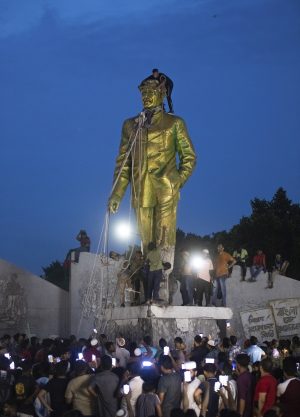In Bangladesh’s ongoing troubles, there are lessons for India, South Asia, and the world at large: the slow death of democracy is never good news for anybody.
For weeks, Bangladesh has been on edge, as student protests roiled its streets over complaints of restricted access to government jobs, political favoritism, and authoritarian overreach. Over the weekend, things came to a head as a large mob of protestors moved toward Prime Minister Sheikh Hasina’s residence in the capital city of Dhaka. Hasina was forced to resign and flee in a helicopter, leaving the country in the hands of the military and a caretaker government.
Hasina’s critics have long argued that the fall of her government was overdue. They have accused her of corrupting Bangladesh’s democratic institutions, trampling on dissent, and building a one-party state. That state has now all but collapsed and nobody knows what will come next. But in South Asia, this is a painfully familiar tale: a populist leader comes to power based on lofty ideals, weaponizes the state, faces widespread opposition, and then leaves behind chaos. From Pakistan to Sri Lanka, the Maldives, and now Bangladesh, a number of South Asia’s fragile republics have been through the cycle, each in their own way.
In New Delhi, as during those other cases, policymakers will once again be worried. Hasina has been a key strategic ally of India’s Prime Minister Narendra Modi. Her government has been a partner in building infrastructure connectivity, resolving border disputes, and countering terrorist groups.
Through much of the 2000s, India had a testy relationship with Bangladesh, primarily animated by concerns over illegal immigration and the functioning of fundamentalist groups in the country, which routinely carried out terrorist attacks or caused unrest in India’s troubled northeast.
After Hasina came to power in 2008, that paradigm seemed to shift. Hasina forged a symbiotic relationship with New Delhi, cracking down on groups such as the infamous Harkat-ul-Jihad-al Islami Bangladesh. She also signed a landmark land border agreement with Modi in 2015 to manage the immigration problem. In return, India launched sundry infrastructure projects running through Bangladesh. These were part of a grand plan to connect India’s mainland with its northeast and onward into Southeast Asia.
But the challenge for New Delhi was that Hasina was becoming increasingly unpopular at home. Through the course of her rule, the Bangladeshi leader steadily packed state institutions with loyalists, jailed political dissidents, and presided over an array of extrajudicial killings. Many of these policies ran in parallel with spurts of religious fundamentalism, which claimed the lives of Bangladeshi rationalists and spooked Indian observers. Hasina justified her authoritarian policies by arguing that the main political opposition party, the Bangladesh Nationalist Party (BNP), had links to radical Islamist groups that threaten the nation’s secular constitutional order. It was an argument that many in New Delhi were willing to buy.
As Bangladesh’s democracy continued to backslide through the years, India made the conscious decision to look the other way. In the elections held in 2014, 2018, and 2024, Hasina returned to power with crushing mandates while the BNP and its leaders were effectively fenced out of the polls. Many in the West, including the United States, publicly questioned the legitimacy of those votes. Ahead of this year’s polls, the U.S. even rolled out a dedicated sanctions program, targeting individuals responsible for undermining democratic processes in Bangladesh. Yet, India continued to throw its weight behind Hasina.
The thinking in New Delhi through the years was that Hasina was the best available bet. India remained so fearful of the return of the political opposition and of religious radicalism that it considered Hasina’s extended rule strategically reasonable, even if that meant the dilution of democratic norms. But as in several other countries across the region and beyond, this was always going to be a risky gamble: In the face of rising authoritarianism and disappearing democratic channels for dissent, Hasina was increasingly at risk of violent protests and popular backlash. That eventuality finally came to pass last week.
In the aftermath of Hasina’s departure, New Delhi is now faced with something far more frightening than the loss of Hasina through democratic means: an uncertain power vacuum and extended political instability. The collapse of democratic institutions over the past decade-and-a-half will now make it significantly more difficult for Bangladesh to have a functioning government that enjoys widespread legitimacy.
But the story of Bangladesh is not entirely unprecedented or even uncommon. If anything, it only further proves why India and the United States must promote robust democratic institutions in South Asia, if they are to compete with China’s cash-rich influence operations in the region. Authoritarian rule has largely proved unstable across much of the region for decades, making autocratic allies risky at best and chaotic at worst.
India especially has much to lose. As the region’s largest and most influential democracy, India’s actions have often been of great interest to both coup plotters and democracy activists across South Asia. Today, in Bangladesh, given its long history of support for Hasina, India faces a crisis of credibility which will make it harder for New Delhi to work with a post-Hasina dispensation. Any government that aligns closely with India could now run the risk of unpopularity and earn the wrath of street protests.
Not for the first time, realism has failed New Delhi.

































